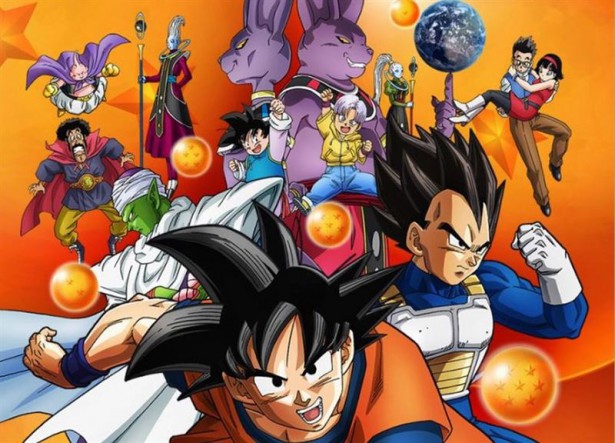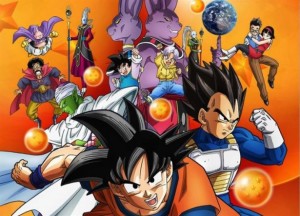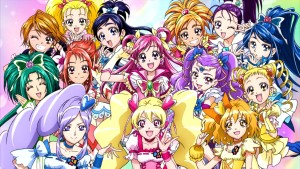It’s time to have a talk about the facts of life. Things do not always go our way. There are a few paths you can take when that happens. You can choose to do whatever it takes to get what you want with no concern for the consequences, you can exercise patience while continuing to strive for the goal or you can move on, choosing to do without.
As of this weekend, Dragon Ball Super began broadcasting in Japan with no simulcast available in the United States. This seems unfathomable to anime fandom here. We’ve become accustomed to having the latest episodes of nearly every animated series airing in Japan within days or hours of the initial broadcast. The globalization of Japanese animation and modern distribution models have made this common place and while our neighbors in Europe, Latin America and even Canada constantly get overlooked in the streaming market, the United States rarely gets left off the guest list. Mainly Gundam fans feel that sting while in most other cases, if it streams anywhere in the world then it probably streams in the United States.
Allow me to address the obvious complaint, Toei dropped the ball here (no pun intended). Dragon Ball Super is the first truly new Dragon Ball animated series in nearly two decades. While it seems like only yesterday that the series was announced for broadcast in Japan, there is no doubt that any interested parties knew this was coming well before the public. As such, there should have been plenty of time to work out whatever deals needed to happen in order to have a simulcast with Japan. They cannot pretend the market is the same as it was when Dragon Ball Kai began broadcasting in Japan much less when Dragon Ball GT originally aired. Simulcasts are not only the demand but also the expectation. Toei has streamed Sailor Moon Crystal, Toriko, World Trigger, One Piece and various other shows in a relatively timely fashion. That said, they are also the company that has not worked out deals to stream Pretty Cure beyond the first series. We can chock that up to a lack of interest from companies in the United States. If anything, Dragon Ball Super has the opposite problem. There may be so many interested parties that Toei is not sure whom to take to the big dance and is dragging their feet.
Exactly where is FUNimation in all of this? It is a chilling thought that they may possibly not get this series. I personally believe they will. I have no reason to doubt they will acquire it or at least have some involvement in the adaptation. One way or another they will be able to get a slice of the pie. Fandom was shocked that they said nothing at Anime Expo, but AX is not the only venue where they can announce Dragon Ball Super. Otakon is right around the corner and historically, FUNimation has shown off their biggest guns there as opposed to Anime Expo. They do not usually break news at San Diego Comic Con like the vast majority of the media industry but Dragon Ball Super is the kind of Japanese animated series that could very well get announced at SDCC. We Toonami fans would certainly be thrilled if Toonami got to break the news during their panel at SDCC. FUNimation could drop a press release at any time. They’ve been known to announce major acquisitions via press release. As a recent example, just before AX they put out a press release announcing the acquisition of the Attack on Titan live-action films. Why they chose not to wait till AX to break the news is simply beyond me, but it gives you an idea of how they go about their business.
I do not believe for a second that we will have to wait very long for Dragon Ball Super and that is why I cannot condone the actions and attitudes of the fandom. A new Dragon Ball series coming to the United States is not a matter of “if” it is a matter of “when”. The problem I see here is a lack of patience. A relatively small part of the overall Dragon Ball fandom in the U.S. has decided that waiting is not an option. While I understand their frustration and I don’t defend Toei’s lack of preparation, I do find the entitled attitudes to be one of the ugliest sides of fandom in our “microwave ready cause I’ve got to have it now” culture. Piracy has been common among anime fandom for decades and it is easier than ever now. There was a time amidst the growth of piracy, in which fans were capable of having enough patience to wait for the legal means of watching shows. What happened to that and can we ever collectively get it back to that? The answer seems to be a resounding bold faced italicized NO. There are plenty of fans who have taken to legal streaming but if they do not have that option for a particular show, even some of the more disciplined fans go flocking to grey-zone piracy because they simply cannot live without watching whatever show it is. There are plenty of shows I’d like to watch that are not legally available and there was a time when I did what everyone else did. However, through my years developing an understanding of what goes into making a cartoon and how the industry continues to function, I have grown fervently opposed to piracy. I generally avoid discussing it and I sure as hell do not promote it. So when I see comments about how the situation has left the fans with no choice but to turn to fansubs and pirated raw episodes of Dragon Ball Super, I cannot help but feel disgusted.
The argument is: if they will not provide it to me, then it should be fine for me to obtain it however I can. I simply cannot agree with that. Companies have every right to enforce their copyrights. Just because something is not licensed for distribution in your region does not mean that no one can take ownership of it. In our increasingly global economy, international copyright matters a great deal. Those who say there are no other options than grey-zone piracy are ignoring one typically viable option and another that is always viable. Importing goods from another country is easier than ever and there are no licensing companies in the U.S. that are willing to sell you something from Japan, there are usually plenty of companies outside of the U.S. that would appreciate your business. I realize that can get expensive but the other option is the most affordable of all: you simply do without. This option is very often ignored because it goes against the human nature of looking out for number one. If you believe there are no consequences to piracy then you will see no reason to abstain from it. The Japanese animation industry is not what it used to be. It is far from going under but the only way to ensure that we can continue to enjoy the variety of shows that come out each season, is to support the shows we like however we can. We are finally able to do that without having to buy expensive home video releases. Supporting the industry is more affordable than it has ever been in the United States, so why not do it? I would like to think that piracy has died down some due to simulcasting but because we are accustomed to having that, fandom feels entitled to it. The lack of a simulcast turns rational adults into whiny children crying for that toy that mommy and daddy said they cannot have.
It is understandable for fans to assume a certain shows will never be licensed or at least will not be licensed any time soon but nobody should expect Dragon Ball Super to get passed over. Take it from a guy who waits for Aniplex dubs to stream, waited for certain Gundam series to stream in the U.S. and is still holding out hope for Hunter x Hunter to be licensed. We can all stand to exercise a little patience here. There are plenty of ways to occupy your time until Dragon Ball Super is available legally in the United States. I doubt the wait will be very long at all.
-Sketch




